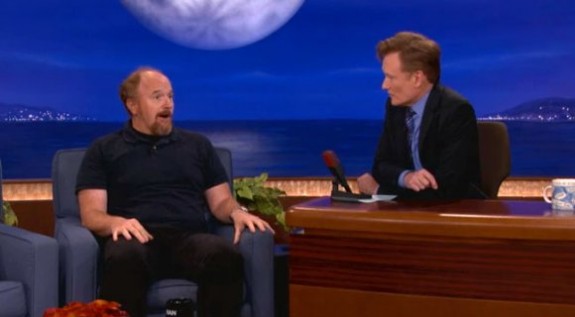In the Los Angeles Times, writer Meghan Daum made a compelling observation, I thought, about the times in which we live—and one moment on television that has captured the country’s attention:
Louis C.K., once merely a gifted comedian, is now a holy man.
Last week, C.K. told Conan O’Brien that he doesn’t let his daughters have smartphones. Children who communicate primarily through social media, he explained, don’t learn basic interpersonal skills because they don’t experience the facial reactions that build empathy.
He then launched into a strangely poignant half rant/half soliloquy about how we reach for our smartphones whenever we start to feel the sadness that creeps up if our minds aren’t otherwise occupied. He spoke about weeping in his car, of listening to Bruce Springsteen, of the elation that can follow despair. It was epic. And preachy.
“People are willing to risk taking a life and ruining their own because they don’t want to be alone for a second,” C.K. said of texting while driving.
Nearly 4.9 million YouTube hits later, this quip has transcended strange poignancy; it’s been anointed as a sacred testament. The enthusiasm is understandable. C.K. was eloquent, honest and both funny and angry in a way that touched a nerve.
But to watch the clip spread like a contagion wasn’t just to see how much the public relates to the existential torpor C.K. talked about. It was to realize how hungry we are for people who can explain to us what we feel and why we feel it…
…Not that there’s any shortage of armchair philosophizing, particularly in the form of Einstein photos posted on the Internet and accompanied by quotations the man probably never said. But links to clips like C.K.’s smartphone rant — call them wisdom links — fall into a special category of electronic existentialism. Short enough to share and view instantly on social media, they are essentially mini-sermons, affable little homilies that remind smart people (or at least people who scoff at ersatz Einstein platitudes) how to be good people.
Take writer George Saunders‘ commencement address atSyracuse University, which went viral this summer after the transcript appeared on the New York Times’ website. The speech focused on the importance of kindness: “As we get older, we come to see how useless it is to be selfish,” Saunders said. Like David Foster Wallace‘s Kenyon College commencement speech eight years ago, in which the author urged graduates to “learn how to think” and to “choose what to think about,” it was received with a degree of awe that suggested these weren’t ideas as much as revelations delivered by oracles with hipster cred.
Then, of course, there’s the Church of the Holy TED Talk, whose videos seem to invite rhapsodic pronouncements in the vein of “this will change your life!” Favorites over the last several years have included a neuroscientist’s description of how suffering a stroke helped her find nirvana, and “Eat, Pray, Love” author Elizabeth Gilbert exhorting us on genius and how to overcome its paralyzing effects on creativity. Read the comments following these links (“mind blowing stuff!” “totally opened my eyes!”) and you’d think you were listening to congregants filing out of a house of worship after the preacher blew the roof off the place.
Read the rest. And watch the now-famous clip of Louis C.K. below.
















